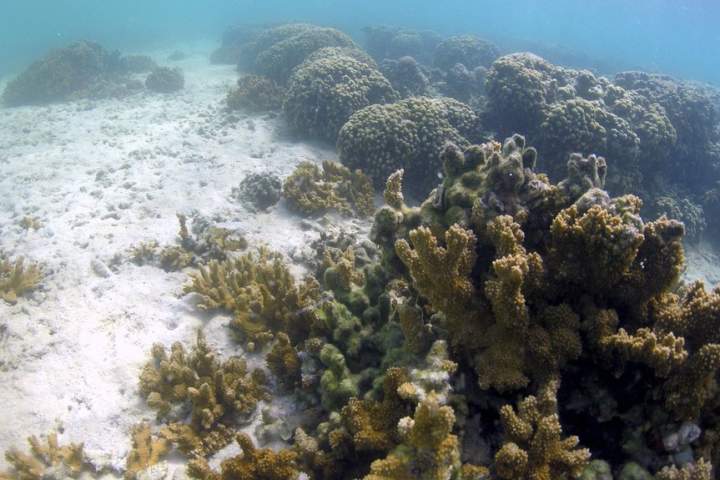Science
Coral Reefs Face Irreversible Decline, Scientists Warn

The world’s coral reefs are on the brink of an almost irreversible decline, according to a report released by a coalition of 160 researchers. This alarming assessment highlights the devastating impact of climate change, announcing what scientists refer to as the first “tipping point” in ecosystem collapse driven by rising global temperatures. The findings come just weeks before the COP30 climate summit, scheduled to take place near the Amazon rainforest in Brazil.
As temperatures continue to rise, the report indicates that the Amazon rainforest, a critical global ecosystem, is now at risk of significant collapse if warming exceeds 1.5 degrees Celsius. This marks a reduction in the previously estimated threshold for the region, raising concerns about the implications for biodiversity and climate stability. The report also warns of potential disruptions to the Atlantic Meridional Overturning Circulation (AMOC), a major ocean current that plays a crucial role in regulating climate, particularly mild winters in northern Europe.
Urgent Call to Action
Environmental scientist Tim Lenton from the University of Exeter, who led the report, emphasized the urgency of the situation. “Change is happening fast now, tragically, in parts of the climate and the biosphere,” he stated. Despite the grim outlook, Lenton noted some positive developments in the global shift away from fossil fuels. According to data from the nonprofit think tank Ember, renewables generated more electricity than coal for the first time this year, indicating a potential turning point in energy production.
Lenton urged nations participating in COP30 to commit to reducing climate-warming carbon emissions. He expressed a desire for countries to avoid feelings of helplessness in the face of climate change. “Nobody wants to be just traumatized and disempowered. We still have some agency,” he remarked.
The urgency of the report is underscored by the fact that average global temperatures have already risen by approximately 1.3 to 1.4 degrees Celsius above preindustrial levels, according to data from U.N. and EU science agencies. The last two years have been the warmest on record, with marine heatwaves affecting 84 percent of coral reefs, leading to extensive bleaching and mortality.
Long-Term Consequences
Coral reefs are vital to marine ecosystems, supporting about 25 percent of all marine life. For these ecosystems to recover, the world would need to implement drastic climate action, aiming to bring temperatures back down to just 1 degree Celsius above preindustrial averages.
Pep Canadell, a senior scientist at Australia’s CSIRO Climate Science Centre, emphasized the report’s critical message: “Each year, there is an increase in the scope and magnitude of the negative impacts of climate change.” Currently, the world is on track for a concerning 3.1 degrees Celsius increase in global temperatures this century, based on existing national policies.
As the COP30 summit approaches, the findings of the Global Tipping Points report serve as a crucial reminder of the immediate need for comprehensive climate strategies. The future of coral reefs and other vital ecosystems hangs in the balance, underscoring the responsibility of global leaders to take decisive action.
-

 Politics4 weeks ago
Politics4 weeks agoSecwepemc First Nation Seeks Aboriginal Title Over Kamloops Area
-

 World5 months ago
World5 months agoScientists Unearth Ancient Antarctic Ice to Unlock Climate Secrets
-

 Entertainment5 months ago
Entertainment5 months agoTrump and McCormick to Announce $70 Billion Energy Investments
-

 Science5 months ago
Science5 months agoFour Astronauts Return to Earth After International Space Station Mission
-

 Lifestyle5 months ago
Lifestyle5 months agoTransLink Launches Food Truck Program to Boost Revenue in Vancouver
-

 Technology3 months ago
Technology3 months agoApple Notes Enhances Functionality with Markdown Support in macOS 26
-

 Lifestyle3 months ago
Lifestyle3 months agoManitoba’s Burger Champion Shines Again Amid Dining Innovations
-

 Top Stories2 months ago
Top Stories2 months agoUrgent Update: Fatal Crash on Highway 99 Claims Life of Pitt Meadows Man
-

 Politics4 months ago
Politics4 months agoUkrainian Tennis Star Elina Svitolina Faces Death Threats Online
-

 Sports5 months ago
Sports5 months agoSearch Underway for Missing Hunter Amid Hokkaido Bear Emergency
-

 Politics5 months ago
Politics5 months agoCarney Engages First Nations Leaders at Development Law Summit
-

 Technology5 months ago
Technology5 months agoFrosthaven Launches Early Access on July 31, 2025




















